Digging Deeper An Introduction
As the world shifts towards renewable energy, the demand for critical minerals is skyrocketing. But mining’s destructive legacy raises urgent questions: Can a just transition reduce or eliminate the need for new extraction? This series explores how social movements are addressing the complexities of mining, justice, and climate action.
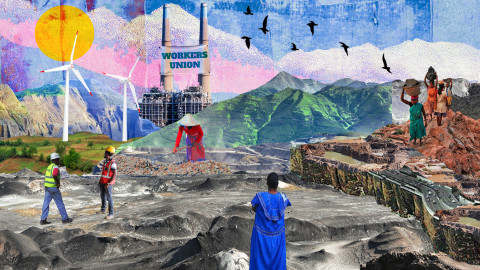
Illustration by Fourate Chahal El Rekaby
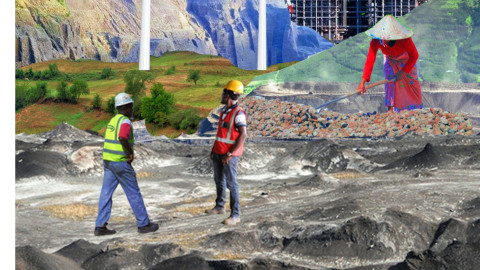
Some proposals, drawn from these discussions:
Reduce demand for minerals and expand autonomy by asking, ‘minerals for what and for whom?’ Whether you believe that mining can be ended in the short term or not, it is clear that ‘the less mining there is, the more communities can say no’. There is enormous scope to expand circular economies, adapting the way that we use, design, distribute and consume products in order to reduce the material demands of economies. This will require directing public policies and public funds (such as the Strategic Projects of the EU Critical Raw Materials Act) towards this, rather than towards clearing the way for new extraction. This is not a matter of choices about personal consumption, but structural solutions that focus on meeting everyone’s needs while consuming fewer resources. While we would expect that countries who are consuming most materials today (in general, Northern countries) would be best placed to reduce total use, Green Industrial Policies in the Global South can also benefit from incorporating principles of re-usability and sustainable design; embracing regional-scale recycling or circular economy initiatives; and focusing on a public pathways approach that prioritises delivering public goods like universal public transportation rather than increasing private consumption, while also considering employment and workers’ demands. At the same time, we must denounce the excessive and often-obscured use of these critical minerals in military and defense industries, and confront the military-industrial complex as a key driver of extractivism.
Fight at every scale for mechanisms to protect the rights of frontline and fenceline communities – and workers. The violence of mining is driven partially by the immense power asymmetries between extractive corporations (both private and state-owned) and affected communities. The struggle to develop, defend, and, above all, implement an architecture of human rights protection has been and will continue to be a key site of struggle for communities. While it must be clear that human rights compliance is a ‘bare minumum’ requirement, the fight for genuine corporate accountability and a recognised community ‘right to say no’ is a necessary precondition for any kind of just mining. The Thematic Social Forum on Mining and Extractivism, the Global Campaign for Peoples’ Sovereignty and Against Corporate Impunity, and the Right to Say No Campaign are spaces where communities are struggling to defend their rights against extraction. These struggles are also embedded at the local and national level, in struggles for national regulatory regimes that protect communities’ rights and territories, and in the defense of Environmental Human Rights Defenders against corporate and state violence. As the pressure grows to mine more, we are seeing new abuses emerging on every continent. Solidarity with these struggles is more important than ever.
Strengthen unions and worker power, including of informal and precarious workers. Working people have many and complex relationships to mining and the just transition – from hyper-exploited mine workers (both formal and informal) and informal workers providing support services to mining camps, to workers in renewable energy sectors, mineral processing factories, to those involved in recycling or circular economy supply chains, workers need to fight in solidarity with one another for decent working conditions and dignified work for all. Even though in certain contexts, informality, migrant worker status and oppressive conditions pose barriers for workers’ ability to unionise and organise, around the world trade unions have had different ways of achieving their goals, working through social dialogue and consultation with governments; through coalitions with global energy democracy and climate justice movements; or through direct resistance, strikes, blockades and occupations. Reducing the harms associated with mineral and material supply chains requires strengthening the bargaining position of all working people, including fighting for pro-union policies and stronger labour rights for all, and building links between unions in different parts of supply chains.
Cancel odious debt, dismantle the global economic structures that drive destructive mining, and fight for a new economic architecture. The global economic architecture has been a key tool to force countries of the Global South into a subordinate position in the global economy, supplying raw materials for industrialised nations. This has super-charged extractivism, intensifying the harms associated with mining. Today individual countries in the Global South, as well as emerging regional blocs and coalitions of Southern countries, are exploring how they can use the changing geography of minerals and energy to re-negotiate their position in the global economy. The WTO, Investor State Dispute Settlement mechanisms in trade and investment agreements and other mechanisms are often obstacles for these efforts. China’s role is complex, as Chinese companies continue to dominate the market in digital and renewable technologies and processing of rare earth minerals. So, rather than trading one exploitative dynamic for another, countries must interrogate how to make more equal trade relationships possible. Social movements can play an important role in developing, articulating and defending visions of a new international economic order – one where the dominance of a few historically colonising countries is challenged. This will include reckoning with the role of new economic powers like China; campaigning for the abolition of odious debt and for the payment of climate reparations; exposing the corporate-extractivist agenda of international bodies like the IMF and WTO; envisioning new kinds of regional integration; challenging unjust and extractive trade agreements (especially their ISDS mechanisms); re-animating discussions of the non-aligned movement and South-South cooperation; and proposing bold ways to re-shape global financial and economic institutions for justice rather than extractivism. Such transformations of the global economy are integral to situating mining within a just transition.
Transfer technology to the Global South so that Southern countries can determine their own development pathways and increase their autonomy. For Southern countries seeking to gain economic autonomy, reduce dependence on extractivism, or bring about their own just transition, the intellectual property regime is a major obstacle. As part of an agenda of climate reparations, there is a need for an urgent re-thinking of the current intellectual property regime (including the WTO Agreement on Trade-Related Aspects of Intellectual Property Rights). In the context of the escalating climate crisis, renewable energy technologies are life-saving technologies. Their use should not be restricted for the sake of enriching patent-holders.
Fight for sustainable rural livelihoods that make people less dependent on extractivism, including through socially just land reform that guarantees a minimum amount of land to those wishing to produce food and other essential goods for themselves and their communities. In contexts where peoples’ only option for survival is participation in mining industries, exploitation and human rights violations are nearly inevitable. Expanding the scope of choice, for individuals and communities, as well as at the level of the national economy increases the possibility of a just outcome. The ‘5Rs’ principles of land reform, first articulated in the complex context of Myanmar, give a guide to what this might look like: redistribution of highly-concentrated land and resources, meaning also redistribution of wealth and power; restitution of land and resource access and control lost through dispossession, displacement and armed conflict; representation of people affected by mining in democratic decision-making processes; recognition of territorial and collective rights to land and resources, including of indigenous and ancestral territories; regeneration of communities, ecologies, forms of political organisation as well as of human-nature and human-human relations. These processes can create the basis for food sovereignty; for feminist economies based around meeting the needs of households and communities; and for more just decision making about land and territories including those potentially affected by mining. In the words of one interviewee, ‘It's important to develop new values around reciprocity, solidarity, sovereignty, food sovereignty, and needs [of] life.’
Fight for genuine democratic decisions, at every level. Mining is a dangerous and dirty business, and it will always produce harms. ‘Green’ mining is a fiction, and therefore any continuation of extraction will involve contestation, but organised movements can fight both to reduce those harms and to distribute them in more just ways. Historically, the costs of new extraction usually fall on those who can least afford them, and least afford to resist: poor, lower-caste, racialised or otherwise marginalised communities and individuals. However, where diverse communities, including workers across mineral/metal supply chains and communities on the front lines of new extraction, can form alliances and coalitions to fight for more democratic decision-making, they can push for more just outcomes. In the words of Lala Peñaranda these should include ‘a wealth of visions… where different solutions respond to different political needs… These visions can include public-community ownership, public-public ownership with community decision-making, and co-ops’. There is an urgent need to develop, defend and put in practice processes for collective democratic decision-making to meet the demands of a just transition. This will involve a process of contestation and political struggle. Better policies alone will not do it. Rather, different groups of working people, including workers and communities affected by mining, can help shape this transition by building solidarity and collective agendas.
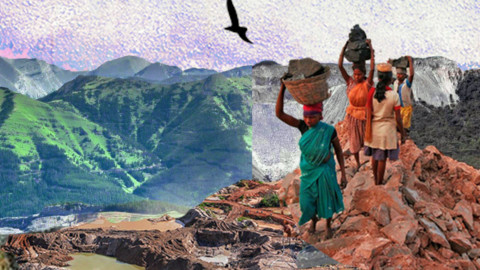
Closing Reflections
These proposals arise out of a preliminary series of conversations, among a small group of people working on these issues. They are initial and partial, and do not represent the full diversity of struggles and proposals related to these issues. The interviewers are grateful to all of those who graciously gave their time to share their work, perspectives, proposals and analyses. We take responsibility for any places where interviewees’ work could have been better showcased or elaborated, where we asked flawed questions or ran out of time or space to explore fascinating points.
In all of these discussions we were guided by the famous injunction: ‘Strengthen the weak and weaken the strong,’ We have tried to understand what this would mean in the context of struggles around mining and just transition. We have begun from the standpoint that questions about how, when, where, by whom, for whom, under what conditions and for whose benefits mining be carried out are intensely political questions. Without confronting the fact that new extractive projects will create both winners and losers, it is not possible to have a meaningful discussion about the impact or significance of new technologies, policies, governance mechanisms, legal instruments or other tools. The contexts in which mining takes place, and the struggles around it, are diverse and there is no one-size-fits-all proposal for navigating these tensions. Diverse movements, embedded in these contexts and working in different forms of cooperation and solidarity have the best chance of providing workable templates for a just transition, and the role of mining within it. We hope that the experiences and thoughts shared in this series provide some inspiration, hope, and food for thought for that ongoing process.
Digging Deeper
Full dossierConversations on Mining and Just Transitions
This series of conversations is aiming to explore challenging questions around mining and the energy transition, and the solutions that social movements are putting forward.
-
Digging Deeper An Introduction
Publication date:
-
Ending corporate impunity & realising the Right to Say No Digging Deeper: Conversations on Mining and Just Transitions
Publication date: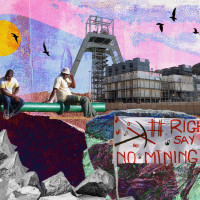
-
Artisanal and Informal Mining Digging Deeper: Conversations on Mining and Just Transitions
Publication date:
-
Mining, Land and Territories Digging Deeper: Conversations on Mining and Just Transitions
Publication date:
-
Right to Repair and Circular Economy Digging Deeper: Conversations on Mining and Just Transitions
Publication date:
-
Green Industrial Policy Digging Deeper: Conversations on Mining and Just Transitions
Publication date: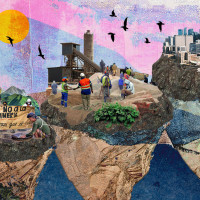
-
Climate finance & Climate reparations Digging Deeper: Conversations on Mining and Just Transitions
Publication date:

